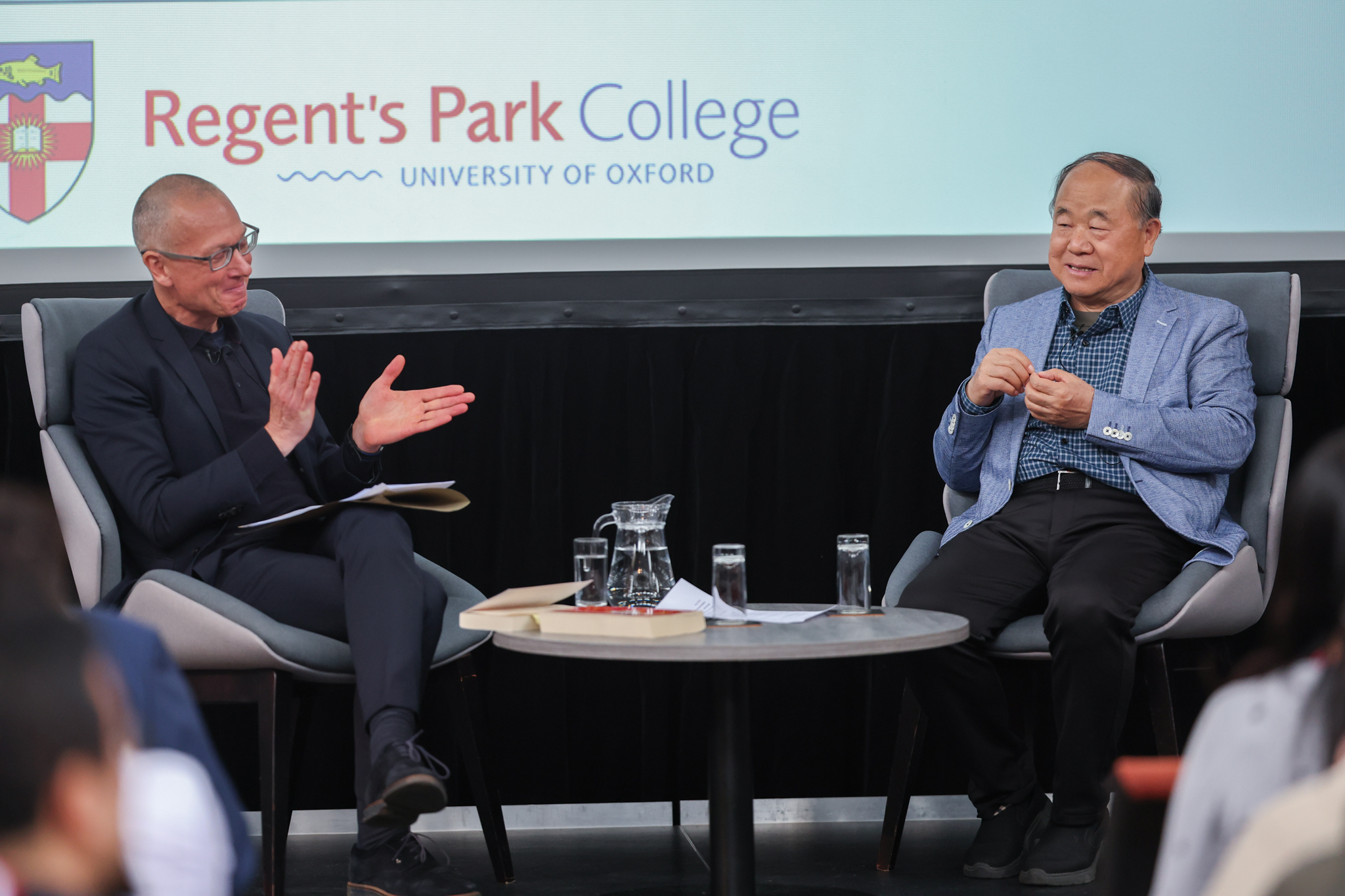In-Conversation with Nobel Laureate and Honourary Fellow, Mo Yan
Date: 4/06/2024

The Sheldonian Theatre at Oxford University was filled with an air of excitement and anticipation as it welcomed the illustrious novelist and Nobel Laureate, Mo Yan. This event, organised by the Oxford Prospects & Global Development Institute at Regent’s Park College (RPC), marked Mo Yan’s highly anticipated return to Oxford, following his conferment as an Honorary Fellow of RPC in 2019.
The evening began with a warm introduction by Sir Malcolm Evans, Principal of Regent’s Park College, who emphasised the importance of Mo Yan’s contributions to global literature. The main feature of the event was a conversation between Mo Yan and literary critic Professor Bart van Es from the Faculty of English at Oxford. This dialogue explored Mo Yan’s transition from a novelist to a playwright, offering insights into his creative processes and the thematic richness of his works.
‘It was truly remarkable event, and it was a real privilege to be able to host Mo Yan. His engagement with the audience, and they with him, was evident as they hung on his every word,’ said Professor Sir Malcolm Evans.
The dialogue began with Professor van Es expressing his admiration for Mo Yan’s work, highlighting the immediate success of Red Sorghum upon its publication in 1986. Van Es praised the sensory immersion in Mo Yan’s writing, noting how the English translation by Howard Goldblatt used the words “red,” “sorghum,” and “wine” effectively to evoke vivid imagery. Mo Yan discussed his deliberate use of sensory details to create a visceral reading experience, drawing parallels to the visual impact of impressionist paintings, particularly those of Monet.
A short reading from Red Sorghum was shared, showcasing Mo Yan’s hallucinogenic writing style. The passage described the transformation of the autumn landscape, weaving in elements of memory and fantasy. Mo Yan explained that his use of colour and sensory details aims to create an immersive world, reflecting his childhood memories and his studies of impressionist art.
The conversation then shifted to Mo Yan’s novel Life and Death are Wearing Me Out, where the protagonist undergoes multiple reincarnations. Mo Yan explained how this structure allowed him to explore various aspects of human and animal life, merging contemporary reality with historical memory. He cited influences from Western literature, including Cervantes, Faulkner, and Hemingway, and discussed how Chinese writers have historically engaged with translated Western works to gain a deeper understanding of global literary traditions.
‘ It was a great pleasure and privilege to be in conversation with Professor Mo Yan. I hope the audience learnt more about his evolution from novelist to playwright, which began with experimental dramas back in the early 1980s, much earlier than I had thought. It was fascinating, too, to hear how he had been influenced by impressionist visual art, by Cervantes, and by Shakespeare. As a Shakespeare professor, it was a joy to hear his love and appreciation of the English national playwright. Professor Mo Yan’s creative drive is clearly as great as ever, with plans for an opera among many other projects. The large audience in the Sheldonian were lucky to hear so much from a writer of such world importance,’ said Professor Bart van Es.
When asked about his transition to playwriting, Mo Yan revealed that his dream of becoming a playwright dates back to his childhood, influenced by a tiny opera in his village. He spoke of the unique challenges of writing for the stage, where collaboration with directors and actors introduces dynamic changes to the script. His play Crocodile, currently touring in China, exemplifies his continued exploration of new forms and themes.
‘By sharing his journey from novelist to playwright, Mo Yan demonstrates a remarkable ability to immerse us in the honest, everyday lives of ordinary people. It is fascinating to understand the importance of nature and humanity in his work. From burning his own early writings to his tremendous success in theatre today, he has undeniably established himself as a successful playwright,’ said Dr Shidong Wang, Director of the Oxford Prospects and Global Development Institute.
The event also celebrated the presentation of the Oxford-BNU Creative Writing Award 2024, an initiative founded by Mo Yan to foster literary talent and promote cross-cultural dialogue. This year’s competition showcased a remarkable diversity of stories, with themes ranging from lost loves and opportunities to transformations and possibilities. The final judging panel of the Award comprised Professor Patrick McGuinness, Boyd Tonkin, Dr Lynn Robson, and Dr Sanjee Perera.
The winner of Oxford-BNU Creative Writing Award is Iseult de Mallet Burgess of Hertford College for ‘Jellyfish‘, which was praised for its atmospheric setting and profound exploration of human experiences within a concise narrative.
‘I’m honoured to have received the Oxford-BNU Creative Writing Award 2024 from Nobel laureate Mo Yan. I have huge respect for the award and for the work of the judges, and I was humbled by their kind words. My story ‘Jellyfish’ explores complex relationships and liminal spaces, and what may be resolved—or dissolved—within them. It was a joy to write. I look forward to continuing my career as a writer and observer of human behaviour. We need our storytellers now more than ever,’ said Iseult de Mallet Burgess.
The Judges also awarded two Highly Commended awards to ‘My Uncle Has the Most Beautiful Hands in Europe’ by Anile Tmava of Green Templeton College, and ‘The Metamorphosis’ by Heather Colley of Regent’s Park College.
The evening concluded with a sense of admiration and inspiration. Attendees left with a deeper appreciation of Mo Yan’s literary genius and his contributions to world literature.
Mo Yan’s visit was not just a celebration of his illustrious career but also an encouragement to aspiring writers and scholars at Oxford to continue exploring the intersections of culture, history, and storytelling. This memorable evening highlighted the enduring power of literature to connect diverse experiences and perspectives across the globe.